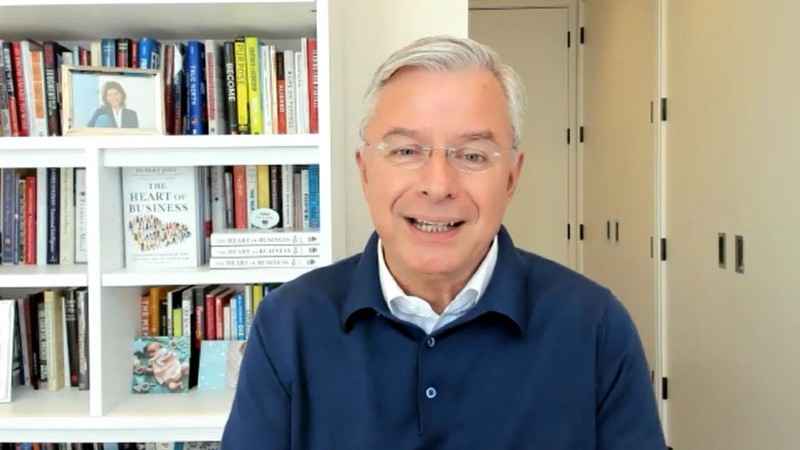Former Best Buy CEO: Companies need to rethink corporate culture, put people first
You could call Best Buy’s Roseville store a part of Hubert Joly’s legacy.
Now the company’s former chairman and CEO is out with a new book called "The Heart of Business."
"Create an environment where you can unleash human magic and you have people who are fired up to do their work," Joly said. "Trust profit as an outcome, not the goal. Obsess about the customer and the employees, and good things happen from a profit standpoint."
Joly, who stepped down as CEO in 2019 and retired as Chairman of the Board the in the midst of the pandemic last June, is credited with turning around a company heading for bankruptcy years before. He says the March 2020 shutdown, prompted by COVID-19 concerns, was a huge jolt.
"Last year when the pandemic hit, there was a sudden shock, even though Best Buy was considered an essential retailer," Joly said.

Former Best Buy CEO Hubert Joly[KSTP]
Initially, Best Buy’s Minnesota stores temporarily closed for one weekend. As an essential retailer during the shutdown, the company was allowed to keep its stores operating, selling items like computers, keyboards and appliances.
Joly says the chain pivoted to contactless curbside pickup in three days.
"The first priority for us as Best Buy was the safety of the employees … and the customers," he said. "We quickly migrated to contactless pickup and then we reopened."
But the pandemic exacted a heavy price.
In April, Best Buy temporarily furloughed 51,000 hourly employees. The company says half those workers were rehired in June. Those employees were later offered a $15 hourly wage.
Joly says growing employee concerns about job stability and working from home were a big wake-up call.
"We discovered our employees are human beings, that they have this whole life and these needs, the anxiety level," he said. "I think it was a big leadership lesson for me. We need to lead from a place of purpose, taking care of our customers and our employees with humanity."
Joly says in an already difficult year, with the death of George Floyd and the riots that followed, there were painful and important lessons for his company.
"Business cannot do well if the community is suffering, and of course we saw that following the horrible murder of George Floyd," he said. "When the city’s on fire, you cannot open the stores, so we’re mutually interdependent."
There have been other changes.
Since the shutdown, Best Buy’s corporate employees, normally based at the company’s Richfield headquarters, have been working remotely. A spokesperson won’t say how many people are affected, but the offices and massive parking lots remain empty.
Joly says he hopes at least some employees, particularly young people, will be able to return.
"People who’ve known each other a long time, we can do this by Zoom," he said. "But newer employees, younger employees, we need to onboard them. We need to build the culture, so I would suspect all the time, we’re going to see a lot of back to the office."
Joly says one program he’s proud of is Best Buy’s role as a founding member of the Partnership for a ConnectedMN.
The company says it helped award more than $2 million in grants to several dozen organizations providing "access to devices, internet connectivity, supportive mentors, coaching, and tech support," to 68,000 Minnesota students.
"One of the key challenges for some people in rural areas, disadvantaged communities is to have good broadband access," Joly said. "To actually learn and work from home."
In February 2021, eight months after Joly’s departure, the pandemic’s impact continued.
Best Buy announced it was laying off 5,000 full-time employees, replacing them with 2,000 part-time workers. At the time, the company said it cut those jobs because customers were buying online instead of in-store. In the meantime, Best Buy said its online sales soared 89% between November and January, compared to the year before.
"This COVD pandemic has been a period of hardship for many," Joly said.
The former CEO wouldn’t discuss specifics on Best Buy’s layoff or sales figures during our interview, referring us to the company’s corporate office.
A Best Buy spokesperson says the company’s workforce now stands at about 100,000 people in the U.S. and Canada, about 21,000 fewer than the year before.
The company says it’s retraining its employees to keep them working while building a flexible workforce. However, the company isn’t releasing any specifics on future hiring or restructuring plans for stores.
Best Buy released a statement, which says in part:
"Over the past year, thousands of employees who possess unique skills were leveraged across multiple areas of our business like virtual sales, chat, phone, and remote support. In addition, we are investing in people in areas like supply chain, small parcel delivery, customer care, and technology in support of our long-term strategy."
In his book, Joly wrote that people should be at the heart of any organization.
He says companies facing financial troubles should cut pay for managers, reduce hours for all employees and make layoffs a last resort.
Joly says corporate executives — especially in a year of pandemic and economic troubles — need to think outside the box.
"The COVID crisis, it’s just accelerated the realization the economic systems we’re living in are not working," he said. "It’s not working for everyone. We need to work together to create a future that does not exist yet, but that needs to be more sustainable than what we’ve seen so far."